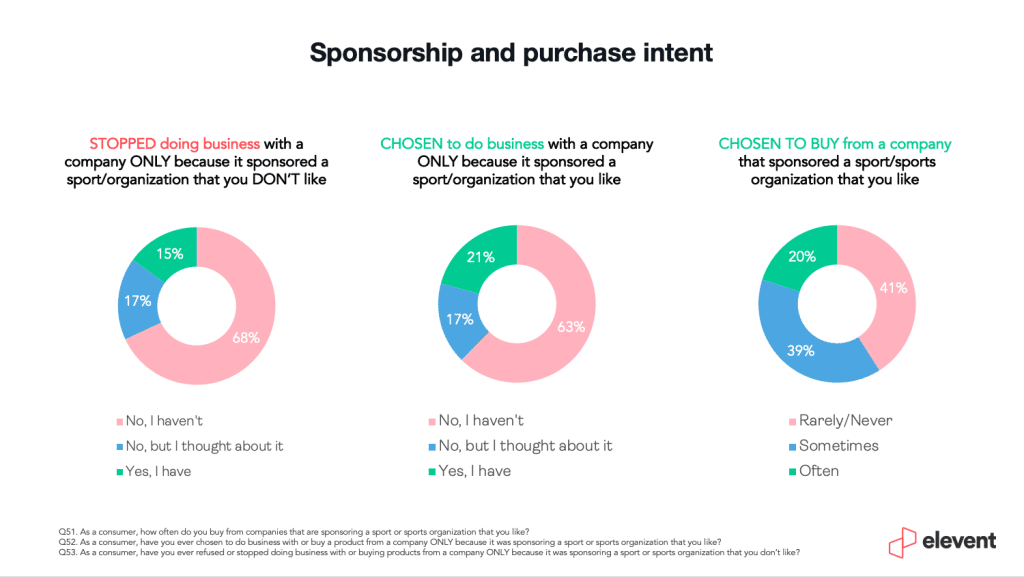Impact of sponsorship on purchase intent

Does sponsorship really work?
That’s a question we at Elevent get asked (a lot).
Sponsorship is a communication strategy that has long been misunderstood solely as a tool to promote brand awareness or as an outlet for experiential marketing. Moreover, limited funding to measure its performance has hindered understanding of how best to leverage its value.
The notion that sponsorship can have an impact further down the marketing funnel is becoming increasingly important in the minds of marketing executives.
Partnerships provide assets that can be used across multiple communication channels to tell stories, break through the noise, and connect with audiences who are truly passionate about a team, an event, etc.
Signing a deal is really the first step in a long-term process. When done right, sponsorship delivers results.
In a recent nationwide survey of 2,000 U.S. adults conducted by Elevent (The Perspectives Study), we found that there was a positive correlation between consumer purchase intent and brand sponsorship of sporting events.
Of those surveyed, 59% responded that they would be more likely to buy from companies that sponsor organizations they like (often/sometimes). In addition, 21% of respondents noted that they chose to do business with a brand solely because it sponsored a specific sport or sports organization.

Perspectives research by Elevent
From a managerial perspective, it was interesting to note that sports fans were very likely to punish sponsors of an opposing team. The effect of this is not insignificant, as 15% of respondents reported that they had stopped doing business with a brand only because it supported an organization they didn’t like.
In light of these insights, one conclusion that can be drawn is that supporting individual teams risks alienating fans of others; a phenomenon that is more likely to occur through partnerships with specific sports teams versus league sponsorships or individual athlete endorsements. As a national brand supporting multiple competing teams, you may therefore want to rethink your communication strategy.
For instance, in activating a partnership, you might consider supporting a long-standing rivalry with humour; focusing on local and targeted communication; or promoting a sport as a whole as opposed to one individual team.
Brands might dig deeper and investigate the impact of this effect on their categories. It may have a stronger influence on FMCG categories, as was shown for NASCAR, but we suspect it could have an impact on the purchase of more durable goods, such as cars and trucks, for instance.
If you’re interested in learning more about The Perspectives Study or would like to discuss how to better measure sponsorship effectiveness, feel free to get in touch with us.
Methodology
Elevent conducted 2,000 online surveys of U.S. adults (ages 18 and older) in the first quarter of 2022. Its aim was to understand the impact of sports sponsorships on American consumers. The comprehensive survey included questions on a wide range of topics, including the impact of sports sponsorship, CSR and athlete advocacy, stadium naming rights, sports fanbases, and more. Results were weighted using Census Bureau data based on age, gender, race, and region of residence of respondents, with a margin of error of ±2% (based on probability, with a confidence level of 95%).
